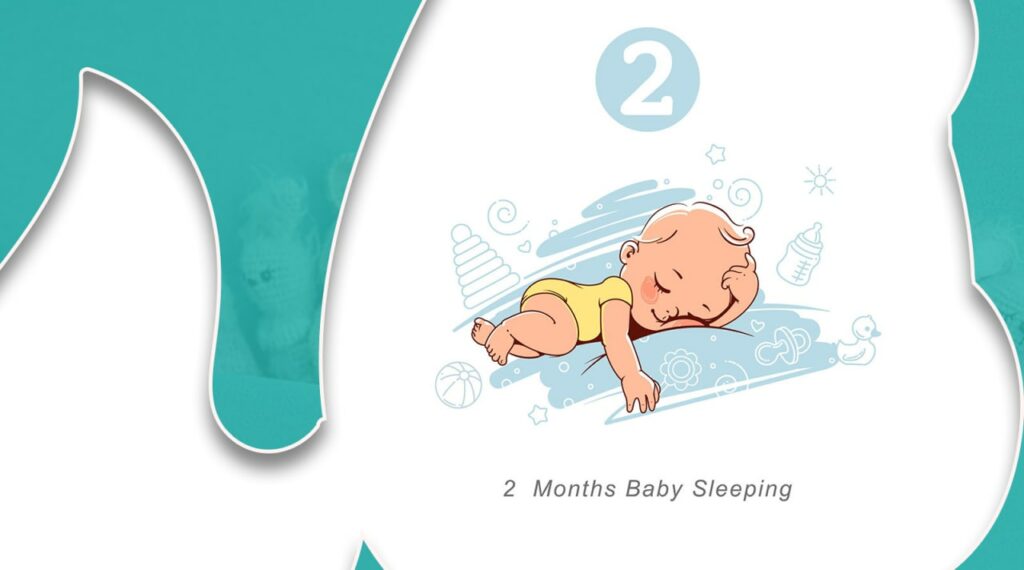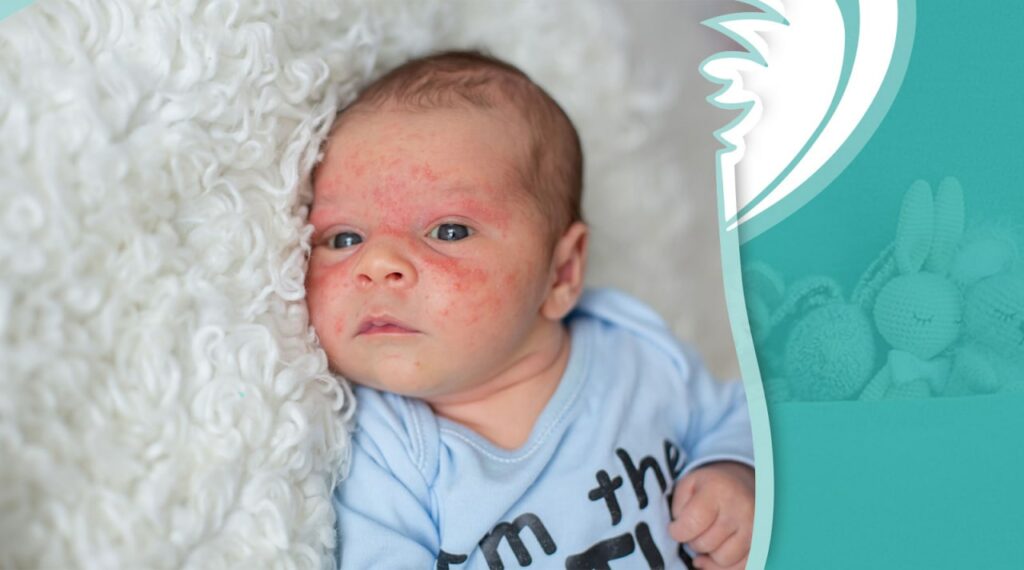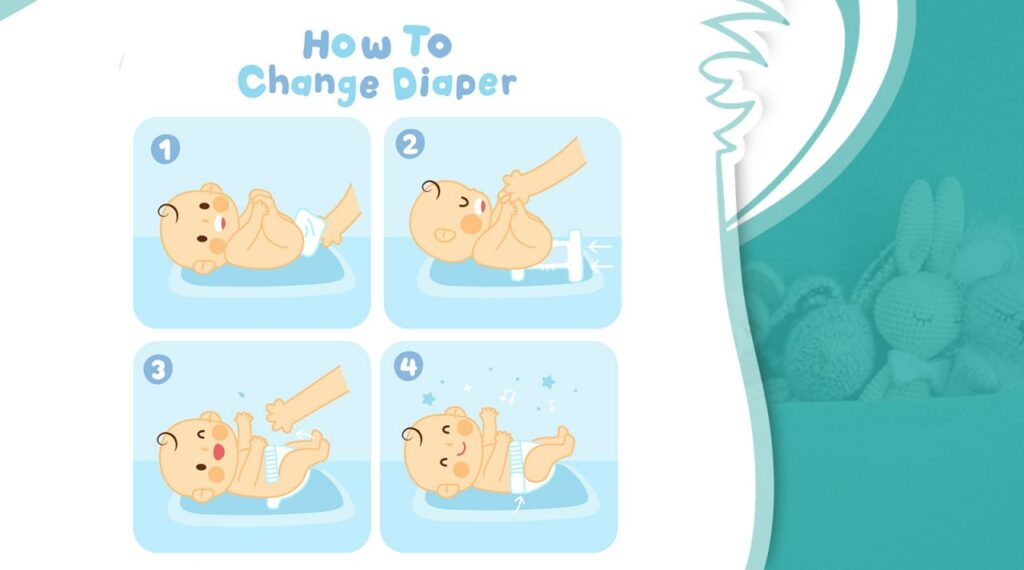This article will look at the developmental stages your two-month-old baby reaches in his or her first two months. You’ll know what to expect from your baby once you’ve finished reading!
At the age of two months, a baby’s growth is noticeable and evident, and mothers will notice it in various ways. At this stage, cognitive, motor, and sensory development is rapid.
You will notice that your two-month-old baby’s development is rapid. Your baby will gain about 1 to 1.5 inches, which is equivalent to 2.5 to 3.8 cm in length and 2 pounds, or about 907 grams in weight. These are only averages; your baby may grow faster or slower, and some babyren may have developmental mutations.
Many of your newborn baby’s reactions disappear at this age, and your two-month-old baby’s movements become less coarse. Your baby can put his hand in his mouth and begin to soothe himself by sucking his hands or fingers. What is clear is that a two-month-old baby begins to try to stick to small objects and toys.
At two months, infants’ vision is also sharpening as they improve their ability to focus on objects and people around them. They also begin to see colors more clearly, particularly bright colors and become more aware that they can look at you when you speak to them and follow you with their own eyes when you move. Your baby will also enjoy looking at your face and smiling at you.
On the other hand, the neck muscles strengthen, and you will notice that when you place your baby on his abdomen, he can move his head, and many babies can move their heads right and left, and you may be surprised that he can lift his chest slightly by the end of the second month.
Your Two-month-old baby can now understand and respond to the emotions conveyed by facial expressions or tone of voice when you speak to him. It may also respond to simple directions or requests appropriately with gestures, babbling, or even crying.

What will your two-month-old baby sleep like?
The period of regular sleep begins in babyren at the age of two months, and the hours of awakening increase during the day. Your baby may sleep 14 to 17 hours per day. The mother will learn about her baby’s bedtime and waking hours. Mothers begin to accustom their babies to a fixed sleep schedule, but this is not always successful.
Your two-month-old baby and food
At this age, the baby requires only milk, whether breastfed or formula-fed. If you follow the breastfeeding method, your baby requires 8 to 12 feedings within 24 hours, with each feeding lasting at least 10 minutes. If you rely on formula milk, the baby requires 6 to 8 feedings per day, with the amount of feed ranging between (148 -177 milliliters) or every 4 hours, according to WHO guidelines.
The baby’s body gets all of its nutrients from milk and doesn’t require any additional water or food. It is worth noting that the processes of bowel waste excretion and disposal slow down during this month, and your baby may encounter constipation for two days. This is normal as your baby grows larger and fatter, and as a result, the stomach expands and the intestines enlarge, allowing waste to remain for a longer period of time, reducing diaper consumption, and the baby requires 4 to 6 diapers per day.
How to help your two-month-old baby grow healthy?
At this age, your baby’s sleep becomes more regular; here are some tips to keep in mind as you spend time with him:
- Massage your baby’s skin with natural oils to help strengthen muscles and bones while also keeping the skin smooth and vibrant. After showering, is the best time to massage your baby. Get him used to some age-appropriate exercises, Some special exercises for babies at this age such as bent and straighten feet, as well as making the right hand touch the left leg and vice versa.
- Make a daily routine for your baby in which you place him on his stomach for 1 to 5 minutes each day to strengthen the muscles in his neck, head, and hands. This will assist him in developing and strengthening the muscles he will require later in life to sit and crawl. However, keep in mind that the best sleeping position for your baby is always on his back or on his right side.
- Spend a considerable time talking and singing to him. He will become accustomed to the sounds and words and will begin to develop language and communication skills.
- Plastic toys and colorful softballs can be used to play with your beloved baby. The various designs, colors, and shapes can stimulate his eyesight and perception.
- Your baby enjoys looking at you, so always smile at him, because his body releases chemicals that make him feel happy, tender, and safe.
- Do not ignore your baby’s monthly doctor’s appointment to have a medical examination and to ensure that his weight and height are appropriate for his age.
When should you worry about your two-month-old baby’s development?
Babies grow at different rates at this age. If your two-month-old baby suffers from any of the following symptoms, you should consult a nursery or a health center:
- Your baby is now 8 weeks old and neither smiles nor sobs.
- Even if you hold him to comfort him, he continues to cry uncontrollably.
- If you look closely, you’ll notice that one side of his body is stronger than the other.
- He does not straighten his fist and maintains a firm grip on his fingers.
- Noises and loud sounds do not bother him.
- It is not properly fed and returns a large amount of milk.
- If you notice that his body is either flexible or tight and hard.
When your beloved becomes a two-month-old baby, it is a significant milestone not only for your baby but also for you. Now that you’ve gotten past the chaos of newborn weeks and staying up late at night, and perhaps you’ve established some sort of routine with your baby, you can finally go outside, take a walk, and even take your baby to the market with you. Not only has your baby changed, but so have you.


